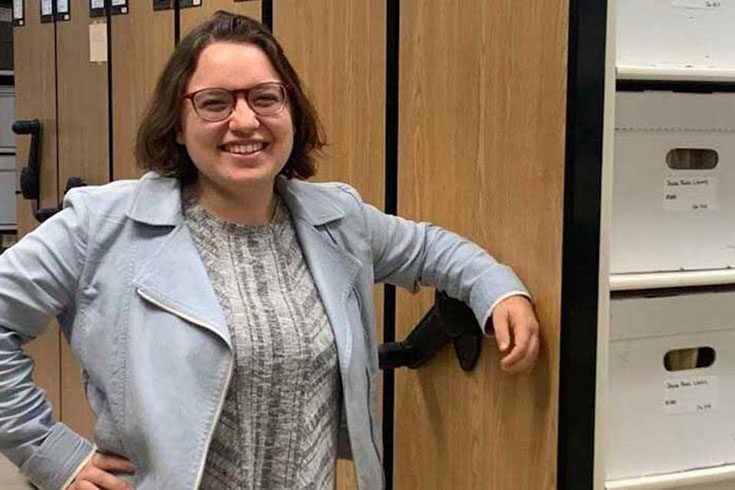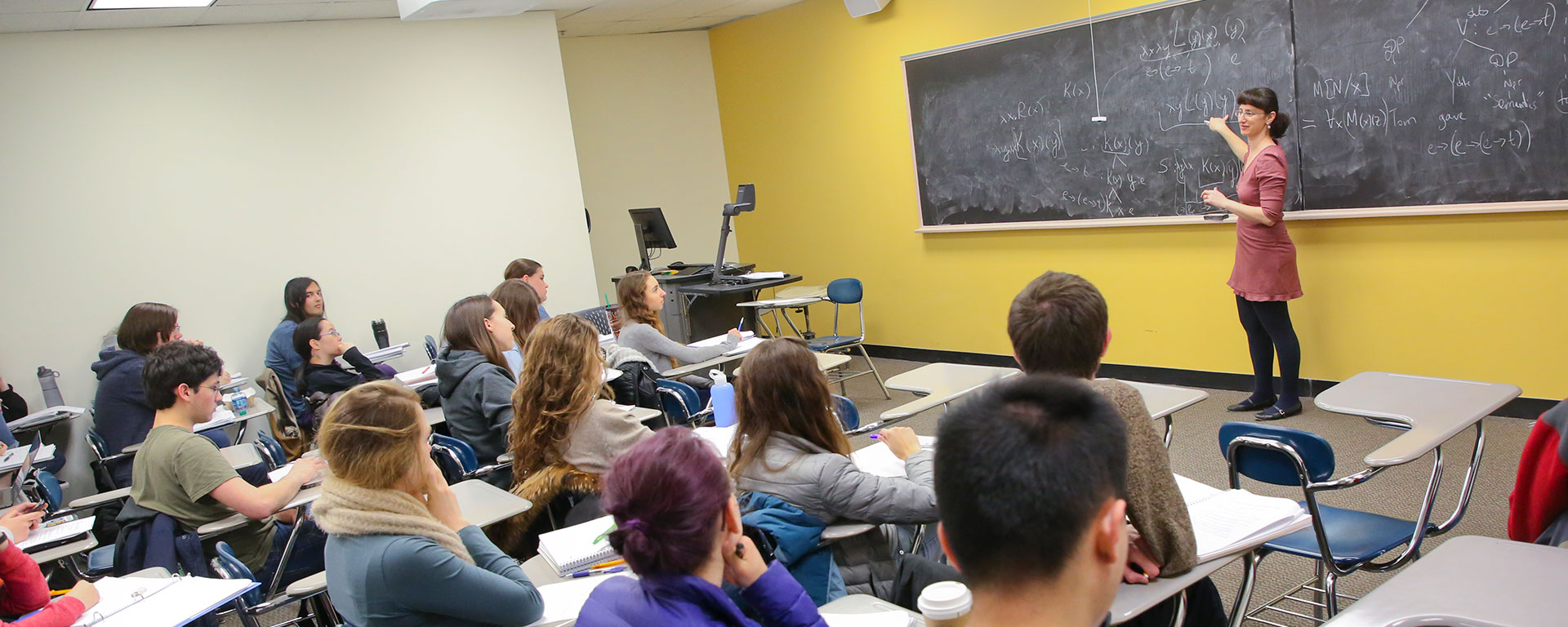Bachelor of Arts in Linguistics
Linguistics is the scientific study of human language, aiming to answer the question “What do we know when we know a language?” Although language is involved in nearly every aspect of the human experience, most people know surprisingly little about how language works.
Linguists research the components of human languages, including the sounds of speech; the organization of sound patterns, words, sentences, discourses, and meanings; variation and change in human languages; and the relationships between language and computation, cognition, and society.
The undergraduate linguistics program at Brandeis offers an in-depth study of human language, and linguistics majors learn the methods, concepts, and theories that will enable them to recognize, explore, describe, and explain the complex patterning of human languages, and of their knowledge and use. Whether you major or minor in linguistics, you can complement your course of study by taking language-related classes in other disciplines, such as anthropology, philosophy, computer science, or neuroscience.
The Linguistics major allows you to develop skills used in a broad range of careers.
Studying Linguistics at Brandeis
At Brandeis, you will be part of a lively and close-knit community of students taught by research-active faculty dedicated to teaching and mentoring. Our faculty will encourage you to discover linguistic patterns for yourself, and to think deeply about language data and linguistic theories. Most of our classes beyond the introductory level are relatively small, allowing for active discussion and engagement with faculty as well as fellow students.
Because of our emphasis on data-driven hypothesis testing, you will graduate with solid skills in data collection, critical thinking, analytical reasoning, and written and oral communication. Our program complements its core focus on theoretical generative linguistics with flexibility in elective choices. We offer core courses on phonological theory, syntactic theory, formal semantics, and formal pragmatics, which students can supplement with a range of electives in linguistics and related disciplines that include computational linguistics, psychology, philosophy, and anthropology, among others.
While the emphasis within the major’s required courses is on the core empirical and theoretical subfields of the field, Brandeis is unusual among other linguistics programs in having a full computational linguistics curriculum alongside our theoretical linguistics courses, run by the same set of faculty. Qualified undergraduate students interested in computational linguistics are invited to take courses from this curriculum, and to opt to apply to our five-year combined Bachelor’s/Master of Science program in Computational Linguistics.
Academics, Teaching and Research
Expand All
The major requires 10 total courses, including core courses on the major subfields of theoretical linguistics, an empirical breadth requirement that may be satisfied by taking linguistics courses or language courses, and a choice of elective courses from within linguistics and related disciplines.
Our faculty hire undergraduates for annotation and other research assistant work, offering you the chance to interact with faculty and graduate students on current research. Linguistics research at Brandeis involves topics in theoretical phonology, syntax, semantics, and pragmatics; historical linguistics; language acquisition and bilingualism; natural language processing and artificial intelligence; as well as the building and annotation of linguistic corpora.
In addition, a number of our advanced courses offer you the opportunity to carry out original research on a topic of your choosing. If you qualify for the thesis program during your junior year, you may consider completing two semesters of more extensive research work in your senior year and writing a senior honors thesis. Recent theses include “The Rhythm of Depressed Speech: An Analysis of Timing Variabilities,” “Patterns of Usage and Change in Nepali Honorific Pronouns”, “The Syntax of Nominalization Constructions in Kham,” and “Modeling the Role in Discourse of the Mandarin Utterance-Final Particle ba.”
Our courses also often recruit top undergraduate students as Teaching Assistants or graders.
Faculty Excellence
Expand All
Our faculty are highly distinguished, and are engaged in collaborative research:
Opportunities Beyond the Classroom
Expand All
We encourage students to participate in summer internships and other summer work connected to their interest in linguistics, and we hold an information session each fall to help students find summer opportunities relating to linguistics. Recent examples include:
-
students interested in research on theoretical linguistics who have assisted faculty at Brandeis or other universities with linguistic research
-
students interested in speech language pathology who have found summer positions in hospitals, research labs, and summer camps working with special populations
-
students interested in computational linguistics who have interned at technology companies or assisted faculty with research
Many of our students elect to study abroad for one or two semesters. Recent students have studied abroad in England, Scotland, Italy, Spain, France, Ecuador, Argentina, China, Japan, and Korea.
Careers and Graduate Study
Expand All
Our graduates commonly embark on careers in a variety of fields that typically involve some combination of a knowledge of linguistics/working with language and the critical thinking skills that studying linguistics develops and stresses. Some of these careers include:
- speech-language pathology
- computational linguistics and natural language processing
- forensic linguistics
- law
- education (including language instruction).
Speech-language pathology has been an especially popular choice for our graduates in recent years, with alumni currently enrolled in or having recently graduated from master’s degree programs at Massachusetts General Hospital, Boston University, Northeastern University, Columbia University, and New York University. These graduates work or have worked in settings ranging including K-12 schools, hospitals, and private clinics and with populations ranging in age from young children to older adults.
Computational linguistics/natural language processing is another popular choice. Students who pursue our computational linguistics curriculum go on to productive careers in computational linguistics and natural language processing—either completing the coursework during their undergraduate studies, or in our Bachelor's/MS program. Such alumni have gone on to work at a range of companies and organizations, including Amazon, Lockheed Martin, MITRE, Mass General Brigham Healthcare System, QPID Health, Linguamatics, Cengage, and Gravyty Technologies.
Throughout the school year, we hold information sessions as part of our ongoing Linguistics Career Series that offer practical guidance on a variety of specific career paths available to linguistics majors. These often feature alumni of the program who return to give advice and share their own experiences in pursuing their career path.
Many graduates of our program pursue an advanced degree in theoretical linguistics, speech-language pathology, computational linguistics/natural language processing, education, law, forensic linguistics, or another related field.
Our graduates have a long-standing record of pursuing doctoral work in prestigious theoretical linguistics programs. Recent alumni are now PhD candidates at or graduates of Cornell University, the Massachusetts Institute of Technology, New York University, Rutgers University, UC Berkeley, the University of Maryland and the University of Michigan.
Prominent linguists who hold a BA in Linguistics from Brandeis teach at top-flight institutions like the University of Chicago, University of Southern California, Hebrew University, Cornell University, the University of California at Berkeley, Carleton University in Canada, and Utrecht University in the Netherlands.

